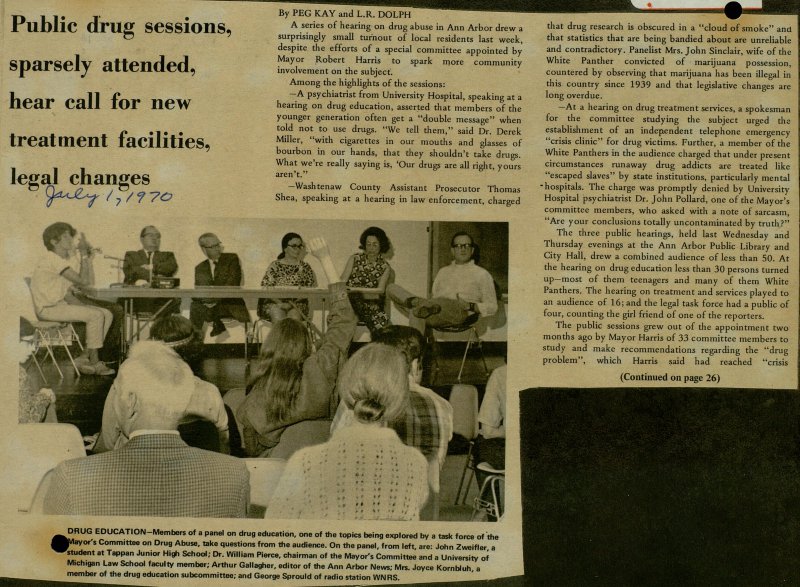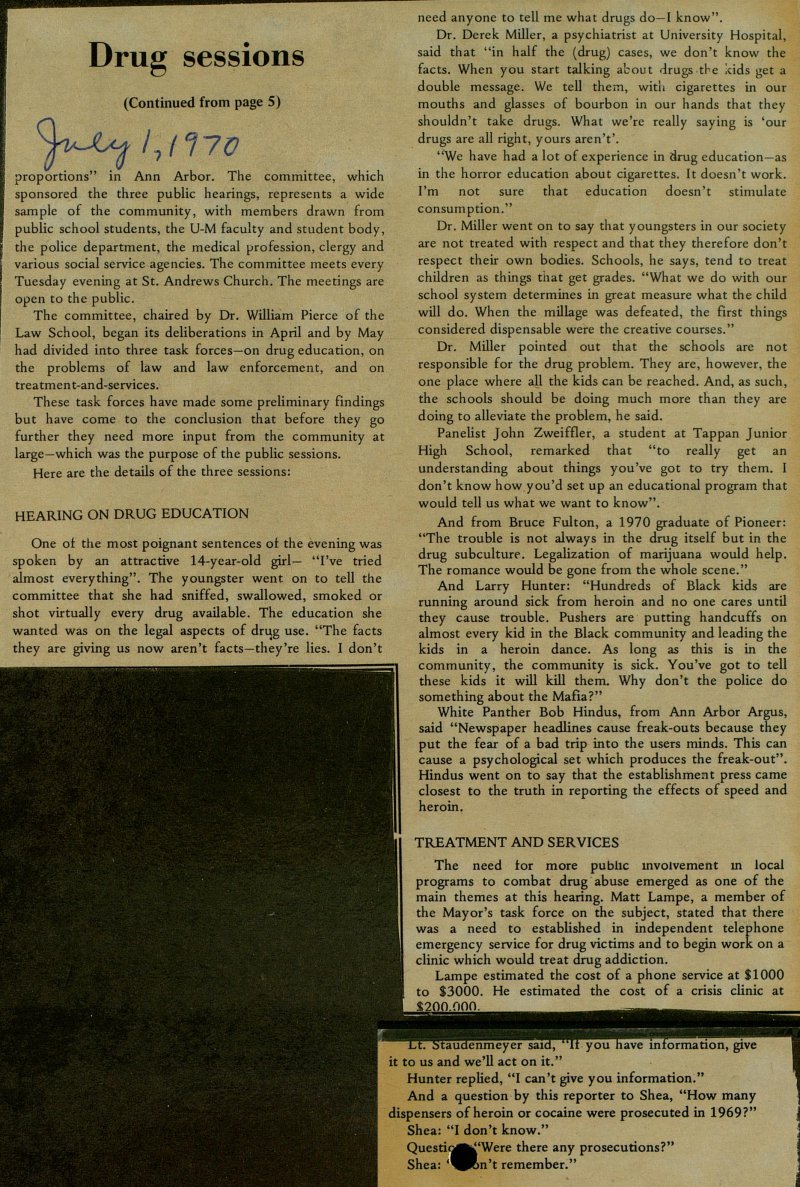Public Drug Sessions, Sparsely Attended, Hear Call For New Treatment Facilities, Legal Changes



A series of hearing on drug abuse in Ann Arbor drew a surprisingly small tufnout of local residents last week, despite the efforts of a special committee appointed by Mayor Robert Harris to spark more community involvement on the subject. Among the highlights of the sessions: -A psychiatrist from University Hospital, speaking at a hearing on drug education, asserted that members of the younger generation often get a "doublé message" when told not to use drugs. "We teil them," said Dr. Derek Miller, "with cigarettes in our mouths and glasses of bourbon in our hands, that they shouldn't take drugs. What we're really saying is, 'Our drugs are all right, yours aren't." -Washtenaw County Assistant Prosecutor Thomas Shea, speaking at a hearing in law enforcement, charged that drug research is obscured in a "cloud of smoke" and that statistics that are being bandied about are unreliable and contradictory. Panelist Mrs. John Sinclair, wife of the White Panther convicted of marijuana possession, countered by observing that marijuana has been illegal in this country since 1939 and that legislative changes are long overdue. -At a hearing on drug treatment services, a spokesman for the committee studying the subject urged the establishment of an independent telephone emergency "crisis clinic" for drug victims. Further, a member of the White Panthers in the audience charged that under present circumstances runaway drug addicts are treated like "escaped slaves" by state institutions, particularly mental -hospitals. The charge was promptly denied by University Hospital psychiatrist Dr. John Pollard, one of the Mayor's committee members, who asked with a note of sarcasm, "Are your conclusions totally uncontaminated by truth?" The three public hearings, held last Wednesday and Thursday evenings at the Ann Arbor Public Library and City Hall, drew a cofnbined audience of less than 50. At the hearing on drug education less than 30 persons turned up-most of them teenagers and many of them White Panthers. The hearing on treatment and services played to an audience of 16; and the legal task force had a public of four, counting the girl friend of one of the reporters. The public sessions grew out of the appointment two months ago by Mayor Harris of 33 committee members to study and make recommendations regarding the "drug problem", which Harris said had reached "crisis (Continued on page 26) Drug sessions (Continued from page 5) proportions" in Ann Arbor. The committee, which sponsored the three public hearings, represents a wide sample of the community, with members drawn from public school students, the U-M faculty and student body, the pólice department, the medical profession, clergy and various social service agencies. The committee meets every Tuesday evening at St. Andrews Church. The meetings are open to the public. The committee, chaired by Dr. William Pierce of the Law School, began its deliberations in April and by May had divided into three task forces- on drug education, on the problems of law and law enforcement, and on treatment-and-services. These task forces have made some preliminary findings but have come to the conclusión that before they go further they need more input from the community at large- which was the purpose of the public sessions. Here are the details of the three sessions: HEARING ON DRUG EDUCATION One oí the most poignant sentences oí the evening was spoken by an attractive 14-year-old girl- "I've tried almost everything". The youngster went on to teil the committee that she had sniffed, swallowed, smoked or shot virtually every drug available. The education she wanted was on the legal aspects of drug use. "The facts they are giving us now aren't facts- they're lies. I don't need anyone to teil me what drugs do- I know". Dr. Derek Miller, a psychiatrist at University Hospital, said that "in half the (drug) cases, we don't know the facts. When you start talking afcout drugs the kids get a doublé message. We teil theiri, with cigarettcs in our mouths and glasses of bourbon in our hands that they shouldn't take drugs. What we're really saying is 'our drugs are all right, yours aren't'. "We have had a lot of experience in drug education- as in the horror education about cigarettes. It doesn't work. I'm not sure that education doesn't stimulate consumption." Dr. Miller went on to say that youngsters in our society are not treated with respect and that they therefore don't respect their own bodies. Schools, he says, tend to treat children as things that get grades. "What we do with our school system determines in great measure what the child will do. When the millage was defeated, the first things considered dispensable were the creative courses." Dr. Miller pointed out that the schools are not responsible for the drug problem. They are, however, the one place where all the kids can be reached. And, as such, the schools should be doing much more than they are doing to alleviate the problem, he said. Panelist John Zweiffler, a student at Tappan Junior High School, remarked that "to really get an understanding about things you've got to try them. I don't know howyou'd set up an educational program that would teil us what we want to know". And from Bruce Fulton, a 1970 gradúate of Pioneer: "The trouble is not always in the drug itself but in the drug subculture. Legalization of marijuana would help. The romance would be gone from the whole scène." And Larry Hunter: "Hundreds of Black kids are running around sick from heroin and no one cares until they cause trouble. Pushers are putting handcuffs on almost every kid in the Black community and leading the kids in a heroin dance. As long as this is in the community, the community is sick. You've got to teil these kids it will kill them. Why don't the pólice do something about the Mafia?" White Panther Bob Hindus, from Ann Arbor Argus, said "Newspaper headlines cause freak-outs because they put the fear of a bad trip into the users minds. This can cause a psychological set which produces the freak-out". Hindus went on to say that the establishment press carne closest to the truth in reporting the effects of speed and heroin. TREATMENT AND SERVICES The need tor more public involvement in local programs to combat drug abuse emerged as one of the main themes at this hearing. Matt Lampe, a member of the Mayor's task force on the subject, stated that there was a need to established in independent telephone emergency service for drug victims and to begin work on a clinic which would treat drug addiction. Lampe estimated the cost of a phone service at $1000 to $3000. He estimated the cost of a crisis clinic at $200.000. ... xTtáuaeñmeyer said, "It you have information, give it to us and we'll act on it." Hunter replied, "I can't give you information." And a question by this reporter to Shea, "How many dispensers of heroin or cocaine were prosecuted in 1969?" Shea: "I don't know." QuestiJ'Were there any prosecutions?" Shea: 'JjRn't remember." In exchanges between White Panthers and Dr. John Pollard, University Hospital psychiatrist and sub-committee member, there was disagreement over present drug treatment facilities. One man who identified himself as the White Panther Minister of Education but declined to give his name, stated that young runaway drug addicts were treated like "escaped slaves" by state mental hospital authorities. Dr. Pollard denied this and asked whether the White Panthers were becoming worried about heroin use. "Yes, very worried," the Panther spokesman replied. "There is a big difference between this summer and last summer. We had our first heroin death this summer." The meeting focused on the problem of formulating civic response to drug use. Questions of drug potency, drug reaction, drug therapy and drug law enformcenet were raised. The Panther spokesman stated that the reasons for drug use are cultural as well as personal. He feit that the use of mairjuana is necessary and called for its legalization. Dr. Pollard said that marijuana and heroin were not the same and stated that marijuana was not habit forming and therefore not a narcotic by medical definition. Lampe called for wider participation to formúlate civic response to the drug problem. "The citizens of Ann Arbor seem willing to become involved only with packaged issues," he said. LAW AND LAW ENFORCEMENT HEARING One ot the scheduied speakers, State Senator Gübert Bursley was unable to attend the hearing as the legislature was still in session in Lansing. His legislative assistant, Miss Janice Marquis, appeared for him and described the state oí drug and narcotics legislation in the State legislature Since Jarmary 1969, more than 40 bilis have been introduced for consideration. Most of these büls are being argued in committee, a few of them on the floor of the legislature, and no one can predict what will pass. It is hoped that the new Governor's Office of Drug Abuse will be able to bring some order to the welter of legislative büls. The governor anticípales that the office will recommend an integrated and comprehensive prosram to curb drug abuse. Washtenaw County Assistant Prosecutor Thomas Shea pointed out that drug research is currently obscured in a cloud of smoke" and that the statistics being bandied about are unreliable and contradictory. He stated that it was premature to consider changes in the law when "we don't know what the problem is". Panelist Mrs. John Sinclair countered that marijuana has been illegal in the United States since 1939 and that legislative change was overdue. Shea said research results were expected within six months. He went on to say that the prosecutor's office has seen a decrease in the number of LSD-connected cases over the past few years, but a significant increase in the use of heroin. He said that participants in breaking-and-entenng cases often showed symptoms of heroin use. Committee member Alan Kantor, an Ann Arbor criminal lawyer, said that 75 to 80 percent of his clients involved in breaking-and-entering were heroin users. Larry Hunter, trom the audience, asked Shea why there wereso many marijuana prosecutions and so few heroin p-fc:utions. Shea stated that the prosecutor's office waíWpendent on the arrests made by the pólice. Hunter then asked Committee member Lt. Eugene Staudenmeyer of the Ann Arbor Pólice Department why heroin arrests weren't made. "An effort should be made", Hunter said, "to catch the big pushers. You should treat the penny-ante pushers and the users as sick people. Everyone knows heroin is running free."
Article
Subjects
Peg Kay
L. R. Dolph
White Panther Party
Marijuana
Huron Valley Advisor
heroin
Drug Use
Drug Laws
Drug Abuse
cocaine
Ann Arbor Argus
Has Photo
Ann Arbor News
Old News
Robert Harris
Leni Sinclair
Larry Hunter
John Sinclair
John Pollard
Janice Marquis
Eugene L. Staudenmaier
Bruce Fulton
Bob Hindus